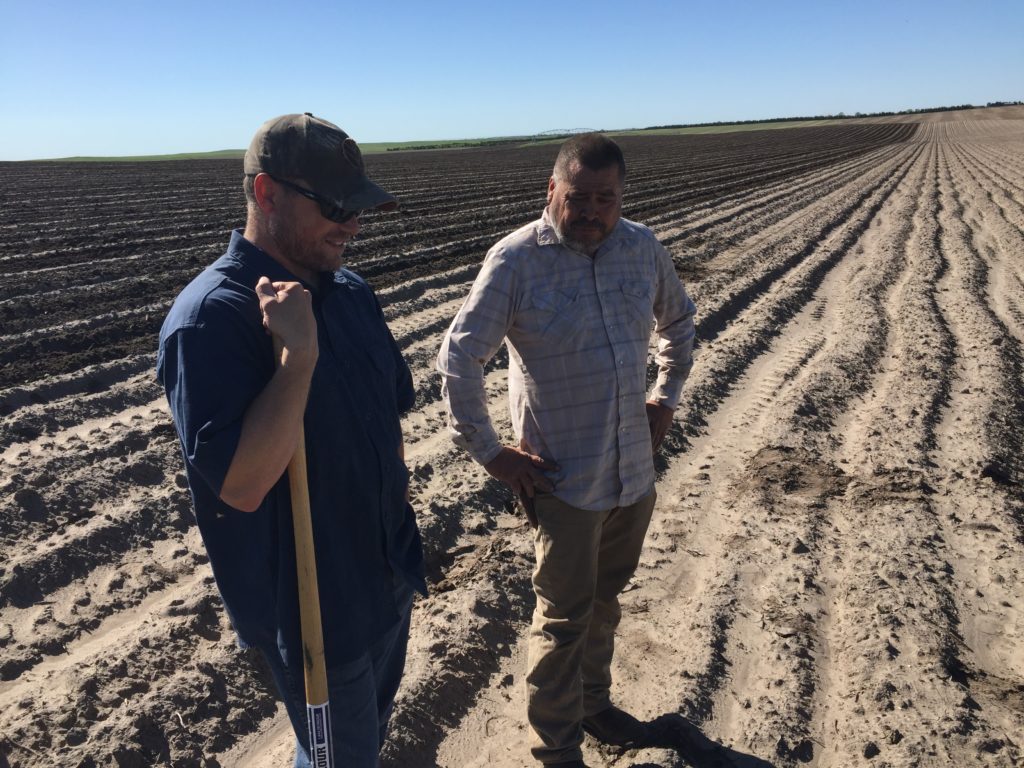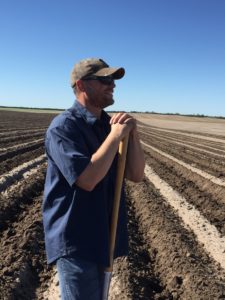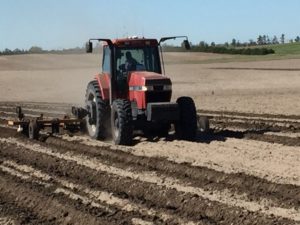
How teamwork and technology keep Western Potatoes strong
Troy Sorensen never doubts that his employees at Western Potatoes will continue working their hardest when he’s not watching, and he’s seldom burdened by turnover, largely due to the unusual way in which the business is structured.
Under terms of an employee stock ownership plan or ESOP, Western Potatoes employees are owner operators, personally vested in the company’s success. The seed potato producer – which farms 3,500 combined acres from its locations in Alliance and Gordon, Nebraska; Holyoke, Colorado and Lakin, Kansas – is owned by 36 employee shareholders, who sell back their stock upon retirement.
“Everybody understands what they do directly affects the success of the company, which translates to their retirement and affects year end bonuses,” said Sorensen, who is in the midst of transitioning to be the head of the operation. “It makes for a more well-rounded staff, more invested on every level.”
 Jim Allen, the current general manager and president of Western Potatoes, plans to move to a part-time role after this year’s harvest, and will retire after the 2019 harvest. He chose Sorensen as his successor, but Allen emphasized no single person owns more than 12 percent of the business.
Jim Allen, the current general manager and president of Western Potatoes, plans to move to a part-time role after this year’s harvest, and will retire after the 2019 harvest. He chose Sorensen as his successor, but Allen emphasized no single person owns more than 12 percent of the business.
“If you’re manager of a farm, it’s a great environment,” Allen said. “We have very little turnover and a pretty motivated workforce.” Louie Knoflicek was 50 years old when he started Western Farms in 1963. Allen explained Knoflicek wanted to repay his workers for their contributions toward his success when he retired 12 years later.
“It was his dream to turn it back to the employees that built the company,” Allen said. The workers formed a corporation and were allowed to buy out all of Allen’s shares over several years. Each year, the value of the company is appraised, and the estimate is used as the basis for the value of each stock share. “They get a stockholder sheet and see their retirement go up or down,” Allen said. “It’s quite a motivator.”
Few U.S. farms are currently structured as ESOPs, according to Michael Keeling, president of the Washington, D.C.-based ESOP Association. The association, which lobbies to preserve favorable ESOP laws and encourages expansion of ESOPs, represents about a quarter of private company ESOPs. Keeling said a 2015 survey of 1,600 association members confirmed just 1 percent of them were businesses involved in crop production. Keeling believes one of the reasons relatively few farms are employee owned is because farms employ a lot of seasonal labor.
Keeling explained experts generally believe ESOPs work best in companies with over 25 full-time workers. He anticipates the continuing trend of farm consolidation will result in more farms converting to ESOPs. “A lot of agricultural businesses have gotten quite large,” Keeling said. The company’s new seed manager, Frank Fabela, is among the many longtime staff members who have thrived in the work culture at Western Farms. Fabela, who recently assumed Sorensen’s previous role, joined the farm about 30 years ago. Fabela explained the employee stock ownership plan arrangement makes workers “feel more involved in everything.”
“I feel in the company like they’re not just right behind you telling you what to do, and they trust you,” Fabela said. “You try to work and do your best so the company grows.”
FROM THE LAB TO THE FARM
Sorensen, 38, and his wife of 18 years, Billi, have a 7-year-old son, Trydon, and a 5-year-old daughter, Benni. Billi’s agricultural roots run deep. She and her father work together operating a wheat farm and ranch in Hemingford, about an hour west of Alliance. However, Sorensen’s background is in science. Sorensen obtained a doctorate in biochemistry and molecular biology from Colorado State University but decided he didn’t want to be a “lab rat.” After graduate school, he returned to Nebraska in 2011 to work as a seed potato inspector.
The nonprofit Potato Certification Association of Nebraska is affiliated with University of Nebraska at Lincoln and overseen by a board of directors comprising seed potato growers. Sorensen put his scientific expertise to good use, helping the organization establish a state-of-the-art diagnostic laboratory, used to screen seed lots for disease. He also helped the organization establish a program to detect and test potatoes and potato psyllids for the liberibacter bacterium, which causes a crop disease affecting tuber quality that had recently arrived in the region, called zebra chip. Impressed by Sorensen’s Army service, his technical background and his familiarity with walking potato fields and scouting for disease, Allen offered him the opportunity to join the staff at Western Potatoes, promising to groom him as the business’s next leader.
“Most importantly, I think strong ethics is pretty much a requirement for this position,” Allen said. Sorensen joined Western Potatoes in 2014, initially as seed manager to capitalize on his expertise. “Having an experience inspecting different farms in our industry, there’s a difference here in the culture at Western Potatoes I recognized early on – a loyalty from upper management all the way down the line,” Sorensen said.
THE FARM
Alliance is located at the center of Nebraska’s panhandle, on the edge of the state’s scenic Sandhills, about 3 hours south of the Black Hills of South Dakota and Mount Rushmore National Memorial. The city’s population is about 9,000, and it’s known for a quirky roadside attraction, Carhenge – a replica of England’s prehistoric monument, Stonehenge, made of old automobiles painted gray.
Corn and cattle are king, but the staff at Western Potatoes believe their region is especially well suited for seed and commercial chipping potato production. Statewide, Allen estimates there are about eight potato growers raising roughly 25,000 acres of spuds. (USDA puts that number closer to 20,000 for 2017, but variations of several thousand acres a year align with USDA numbers.) About 60 percent of Western Potatoes’ production is commercial chipping potatoes, shipped throughout most of the year to a Frito-Lay plant in Denver. The other 40 percent is sold throughout the country as seed.
The staff raises seed from the nuclear generation – resulting from the first minitubers produced in a greenhouse – through the third field generation. Nebraska has a rule requiring seed producers to undergo extra testing and certify all of their acres, including acres intended for commercial sale, as seed. Complying with the requirement is costly, but Sorensen said the policy provides an added safeguard to keep seed inventories disease-free.
He said it also comes in handy in years when certain seed fields sustain heavy hail damage and his farm has the flexibility to substitute seed from later-generation fields intended for commercial sale. A major benefit of raising spuds in the Cornhusker State is that potato fields are spread far apart, limiting the potential of diseases tainting the seed supply, Sorensen said. Western Potatoes specializes in potatoes and hard red winter wheat. To diversify their rotations, they rent additional acres for spuds and allow other farmers to raise beets, corn, alfalfa and dry edible beans on their ground, in exchange for a percentage of yields.
 A FOCUS ON SUSTAINABILITY
A FOCUS ON SUSTAINABILITY
Western Potatoes has upgraded its software, evaluated new chipping potato varieties and narrowed the spacing of its seed rows in beds, all in an effort to produce more crops with fewer inputs. “For us, sustainability is the biggest thing,” Sorensen said. “That’s where customers are going, so how can we operate more efficiently and sustainably? How can we use less inputs and get the same or better yields?” Western Potatoes recently earned its Good Agricultural Practices certification, passing a voluntary audit to document its produce is packed and handled safely and efficiently. The business is in its third year of implementing new management software, called CropTrak, which allows field workers to enter data in real time, using iPads. Sorensen said CropTrak has already streamlined record keeping, and made data easier to access. “When I first got here, we were keeping track of the same records for customers and ended up duplicating and triplicating stuff because they all needed to be in a different format,” Sorensen said.
This summer, he hopes the software will help him better monitor all four farms and guide management decisions intended to improve efficiency. “This helps me see more what’s going on at a finer detail than I think I would have gotten without it,” Sorensen said. The farm also participates in variety trials, seeking chipping potatoes that mature earlier in the season and yield the same with less water and fertilizer.
“We look at a lot of varieties, both public and private, and evaluate them through our own quality-control processes,” Sorensen said. Having farms in four locations, each with different harvest seasons, helps Western Potatoes ship fresh spuds to customers year-round. The structure also spreads out risk, in case yields drop at one or more of the farms. Simply reducing the width of rows in seed potato beds has enabled Western Potatoes to significantly reduce waste due to oversized potatoes that wouldn’t meet seed specifications.
In its early generation seed, Sorensen said the farm switched from using traditional spacing, with six rows spaced 36 inches apart, to three beds, each containing three 18-inch rows. “Quality wise, we’ve really made some big improvements with a really uniform seed size, and just a better quality product I think,” Sorensen said. “It’s a good-looking potato coming out of the ground.”







